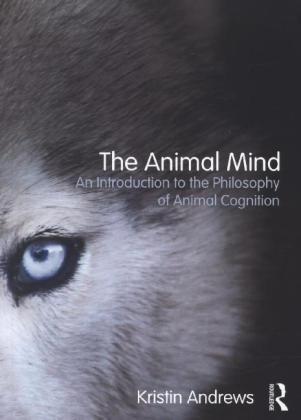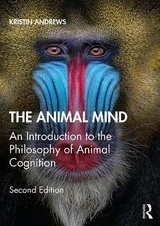
The Animal Mind
An Introduction to the Philosophy of Animal Cognition
Seiten
2014
Routledge (Verlag)
978-0-415-80960-3 (ISBN)
Routledge (Verlag)
978-0-415-80960-3 (ISBN)
- Titel erscheint in neuer Auflage
- Artikel merken
Zu diesem Artikel existiert eine Nachauflage
The study of animal cognition raises profound questions about the minds of animals and philosophy of mind itself. Aristotle argued that humans are the only animal to laugh, but in recent experiments rats have also been shown to laugh. In other experiments, dogs have been shown to respond appropriately to over two hundred words in human language.
In this introduction to the philosophy of animal minds Kristin Andrews introduces and assesses the essential topics, problems and debates as they cut across animal cognition and philosophy of mind. She addresses the following key topics:
what is cognition, and what is it to have a mind? What questions should we ask to determine whether behaviour has a cognitive basis?
the science of animal minds explained: ethology, behaviourist psychology, and cognitive ethology
rationality in animals
animal consciousness: what does research into pain and the emotions reveal? What can empirical evidence about animal behaviour tell us about philosophical theories of consciousness?
does animal cognition involve belief and concepts; do animals have a ‘Language of Thought’?
animal communication
other minds: do animals attribute ‘mindedness’ to other creatures?
moral reasoning and ethical behaviour in animals
animal cognition and memory.
Extensive use of empirical examples and case studies is made throughout the book. These include Cheney and Seyfarth’s ververt monkey research, Thorndike’s cat puzzle boxes, Jensen’s research into humans and chimpanzees and the ultimatum game, Pankseep and Burgdorf’s research on rat laughter, and Clayton and Emery’s research on memory in scrub-jays.
Additional features such as chapter summaries, annotated further reading and a glossary make this an indispensable introduction to those teaching philosophy of mind, animal cognition. It will also be an excellent resource for those in fields such as ethology, biology and psychology.
In this introduction to the philosophy of animal minds Kristin Andrews introduces and assesses the essential topics, problems and debates as they cut across animal cognition and philosophy of mind. She addresses the following key topics:
what is cognition, and what is it to have a mind? What questions should we ask to determine whether behaviour has a cognitive basis?
the science of animal minds explained: ethology, behaviourist psychology, and cognitive ethology
rationality in animals
animal consciousness: what does research into pain and the emotions reveal? What can empirical evidence about animal behaviour tell us about philosophical theories of consciousness?
does animal cognition involve belief and concepts; do animals have a ‘Language of Thought’?
animal communication
other minds: do animals attribute ‘mindedness’ to other creatures?
moral reasoning and ethical behaviour in animals
animal cognition and memory.
Extensive use of empirical examples and case studies is made throughout the book. These include Cheney and Seyfarth’s ververt monkey research, Thorndike’s cat puzzle boxes, Jensen’s research into humans and chimpanzees and the ultimatum game, Pankseep and Burgdorf’s research on rat laughter, and Clayton and Emery’s research on memory in scrub-jays.
Additional features such as chapter summaries, annotated further reading and a glossary make this an indispensable introduction to those teaching philosophy of mind, animal cognition. It will also be an excellent resource for those in fields such as ethology, biology and psychology.
Kristin Andrews is Associate Professor in the Department of Philosophy and Director of the Cognitive Science Program at York University, Canada. She is the author of Do Apes Read Minds? Toward a New Folk Psychology (2012), and editor of the forthcoming Routledge Handbook of Animal Cognition.
Introduction 1. Kinds of Minds 2. Science of Other Minds 3. Consciousness 4. Rationality, Belief, and Content 5. Communication 6. Knowing Other Minds 7. Minds and Morals. Index
| Verlagsort | London |
|---|---|
| Sprache | englisch |
| Maße | 174 x 246 mm |
| Gewicht | 446 g |
| Themenwelt | Geisteswissenschaften ► Philosophie ► Ethik |
| Geisteswissenschaften ► Psychologie | |
| Naturwissenschaften ► Biologie ► Zoologie | |
| Sozialwissenschaften ► Soziologie | |
| ISBN-10 | 0-415-80960-6 / 0415809606 |
| ISBN-13 | 978-0-415-80960-3 / 9780415809603 |
| Zustand | Neuware |
| Haben Sie eine Frage zum Produkt? |
Mehr entdecken
aus dem Bereich
aus dem Bereich



